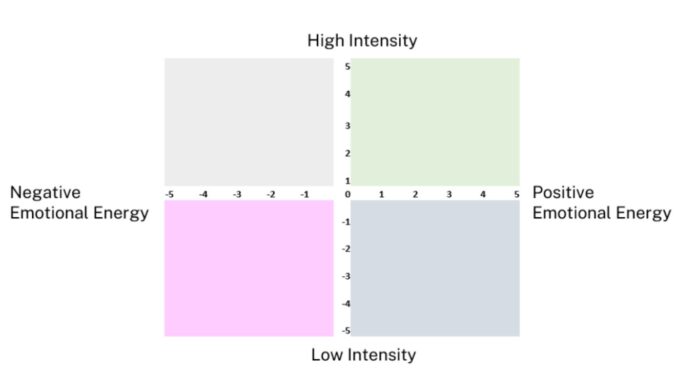
Why leaders should learn to value the boundary spanners
Entrepreneurial talent who work with other teams often run into trouble with their managers. Here are ways to get the most out of your ‘boundary spanners’...

by Silke Mischke Published December 5, 2023 in Brain Circuits • 6 min read
Our ever-present emotions impact our thoughts and actions in sometimes surprising ways. Emotionally aware leaders who effectively embrace their feelings are more likely to serve as role models and inspire their teams.
Emotions have an adaptive function for us. Disregarding them means foregoing critical data that is relevant to make sense of a specific context or situation.
Leaders can build on the information they convey using this step-by-step approach, which I have simplified here and named “the four Ls of emotional resilience.”
Embrace what you are feeling in the present – in other words, practicing mindfulness. Acknowledge that you are experiencing emotions but don’t judge them. Suspending judgment is critical and requires self-empathy.
Go deeper when it comes to exploring your emotional energy. Are these emotions positive or negative? How intense are they? Do you feel high energy or low energy? What is the exact feeling? Fear? Surprise? Anger? A combination? (It’s rare to feel just one emotion at a time.) Describing your emotions will help you understand where they come from and how to best work with them.
Ask yourself how you feel right now:

Reflect on the impact your feelings have. Why are you feeling this way? How does this impact others? How can you effectively work with this emotion? Do you need to process it, or can you benefit from this energy?
As a leader, how can you use what you have learned to suit your big-picture purpose, mission, or goals?
Consider the case of a VP for a global medical device company who came to us amid the COVID crisis. We’ll call this person Kim. (We disguised all identifiable details of this executive, so don’t bother trying to guess who it was.) Sales had dipped 32% annually and the forecast looked grim, so Kim was tasked with reducing headcount by an estimated 18% to keep the company viable. Kim reported feeling worried and anxious, but not on account of their own situation, as they were quite senior in the company and nearing retirement. By taking stock – listening to and labeling their emotions – Kim realized they felt fear on behalf of their team. So how could they leverage that knowledge?
What Kim did next was to create a space for their team to be honest about their fears and for management to address what they might be able to do to help. This space allowed them to explore even what was outside of management’s control. By doing this, Kim moved closer to team members than would have been possible with bottled-up feelings. This helped by building trust, increasing their emotional resilience.
Watch a video and read more here: Second that emotion – building emotional resilience

Senior Leadership Advisor and Lecturer, IMD and EPFL
Silke Mischke is a Senior Leadership Advisor and Leadership Lecturer at IMD and EPFL, where she teaches leadership in the E4S Master in Sustainability Management, a joint program by IMD, EPFL, and UNIL. She holds a Doctorate in Business Administration and a Master’s degree in Cognitive Psychology. Her work focuses on leadership through the lens of emotional intelligence, exploring its impact on individuals, teams, and organizational performance. She coaches and teaches leaders and teams from a wide range of international organizations, supporting their development through both individual and collective learning. At IMD, she also serves as Co-Director of the Executive Coaching Certificate program.

July 3, 2025 • by Eric Quintane in Brain Circuits
Entrepreneurial talent who work with other teams often run into trouble with their managers. Here are ways to get the most out of your ‘boundary spanners’...

July 2, 2025 • by Susan Goldsworthy in Brain Circuits
When we feel stressed, we’re more likely to operate from a place of fear and fall back on a mindset that is fixed, judgmental, and focused on polarities – behaviour that soon...

July 1, 2025 • by Gopi Kallayil in Brain Circuits
Artificial intelligence is perhaps the most far-reaching technology ever created. Google’s AI business strategist Gopi Kallayil recommends asking yourself three key questions regarding your business strategy and identifies three AI capabilities you...

June 30, 2025 • by Sunita Sehmi in Brain Circuits
Many leaders feel compelled to motivate their teams to perform by being highly solutions-focused – but learning rather than directing often leads to better results. Consult the following checklist to guage whether...
Thinking Fast and Slow by Daniel Kahneman

Senior Leadership Advisor and Lecturer, IMD and EPFL
Silke Mischke is a Senior Leadership Advisor and Leadership Lecturer at IMD and EPFL, where she teaches leadership in the E4S Master in Sustainability Management, a joint program by IMD, EPFL, and UNIL. She holds a Doctorate in Business Administration and a Master’s degree in Cognitive Psychology. Her work focuses on leadership through the lens of emotional intelligence, exploring its impact on individuals, teams, and organizational performance. She coaches and teaches leaders and teams from a wide range of international organizations, supporting their development through both individual and collective learning. At IMD, she also serves as Co-Director of the Executive Coaching Certificate program.

July 3, 2025 • by Eric Quintane in Brain Circuits
Entrepreneurial talent who work with other teams often run into trouble with their managers. Here are ways to get the most out of your ‘boundary spanners’...

July 2, 2025 • by Susan Goldsworthy in Brain Circuits
When we feel stressed, we’re more likely to operate from a place of fear and fall back on a mindset that is fixed, judgmental, and focused on polarities – behaviour that soon...

July 1, 2025 • by Gopi Kallayil in Brain Circuits
Artificial intelligence is perhaps the most far-reaching technology ever created. Google’s AI business strategist Gopi Kallayil recommends asking yourself three key questions regarding your business strategy and identifies three AI capabilities you...

June 30, 2025 • by Sunita Sehmi in Brain Circuits
Many leaders feel compelled to motivate their teams to perform by being highly solutions-focused – but learning rather than directing often leads to better results. Consult the following checklist to guage whether...
Explore first person business intelligence from top minds curated for a global executive audience